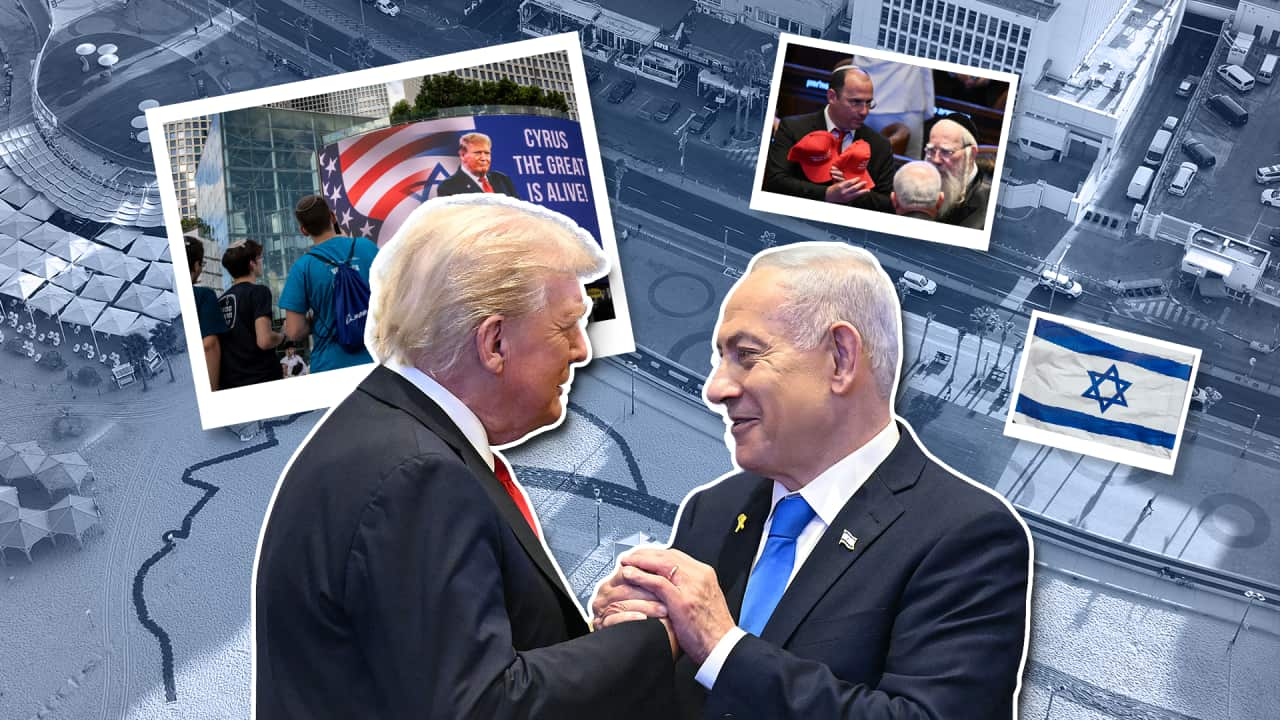Even from a plane 150 metres above Israel, it would have been impossible to miss the hero's welcome that greeted United States President Donald Trump on Monday.
Trump arrived in the country on the day Hamas, a Palestinian political and military group, released the remaining 20 Israeli hostages who were still alive after being taken during the October 7 attack two years ago.
Jubilant crowds had gathered in the coastal Israeli city of Tel Aviv, some holding signs saying "Thank you Mr President" as they gathered to watch the historic event live on large screens in Hostages Square, where families of those captured had established a permanent encampment in the wake of October 7.
Footage of Tel Aviv beach shows a massive sign featuring a silhouette image of Trump's head with the message "thank you", which could be seen from his presidential plane, Air Force One, as he approached the city.
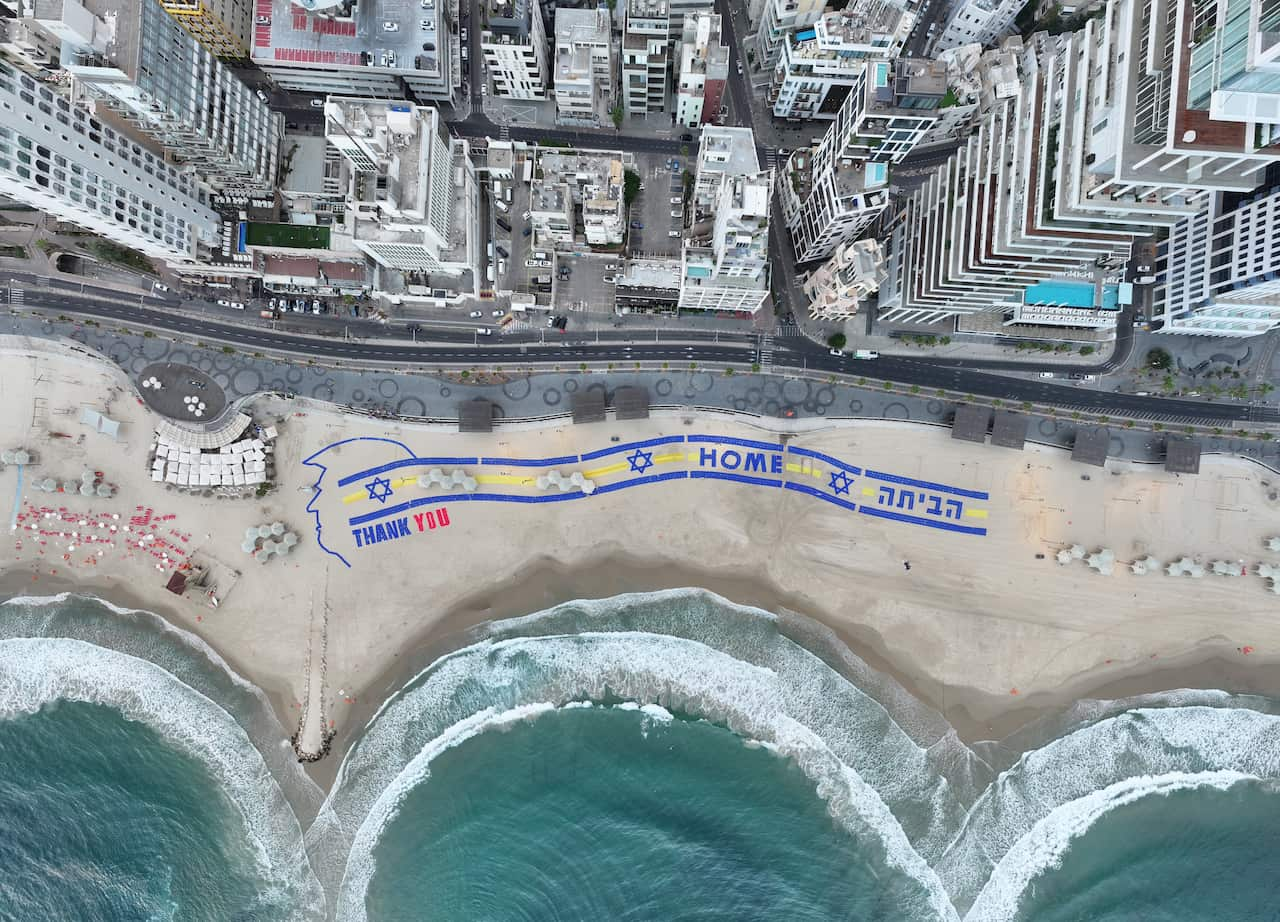
Even in the Knesset — Israel's parliament — where Trump made a speech on Monday, some wore bright red caps with the words "Trump The Peace President" printed on them, in a style reminiscent of his signature Make America Great Again hats.
Itamar Rabinovich, professor emeritus of Middle Eastern history at Tel Aviv University, says there has been an outpouring of public support and gratitude for Trump in Israel.
"He is perceived as the leader who brought the war in Gaza to an end," Rabinovich tells SBS News.
In contrast, Israeli Prime Minister Benjamin Netanyahu is seen by many as the prime minister who wanted to keep the war going.
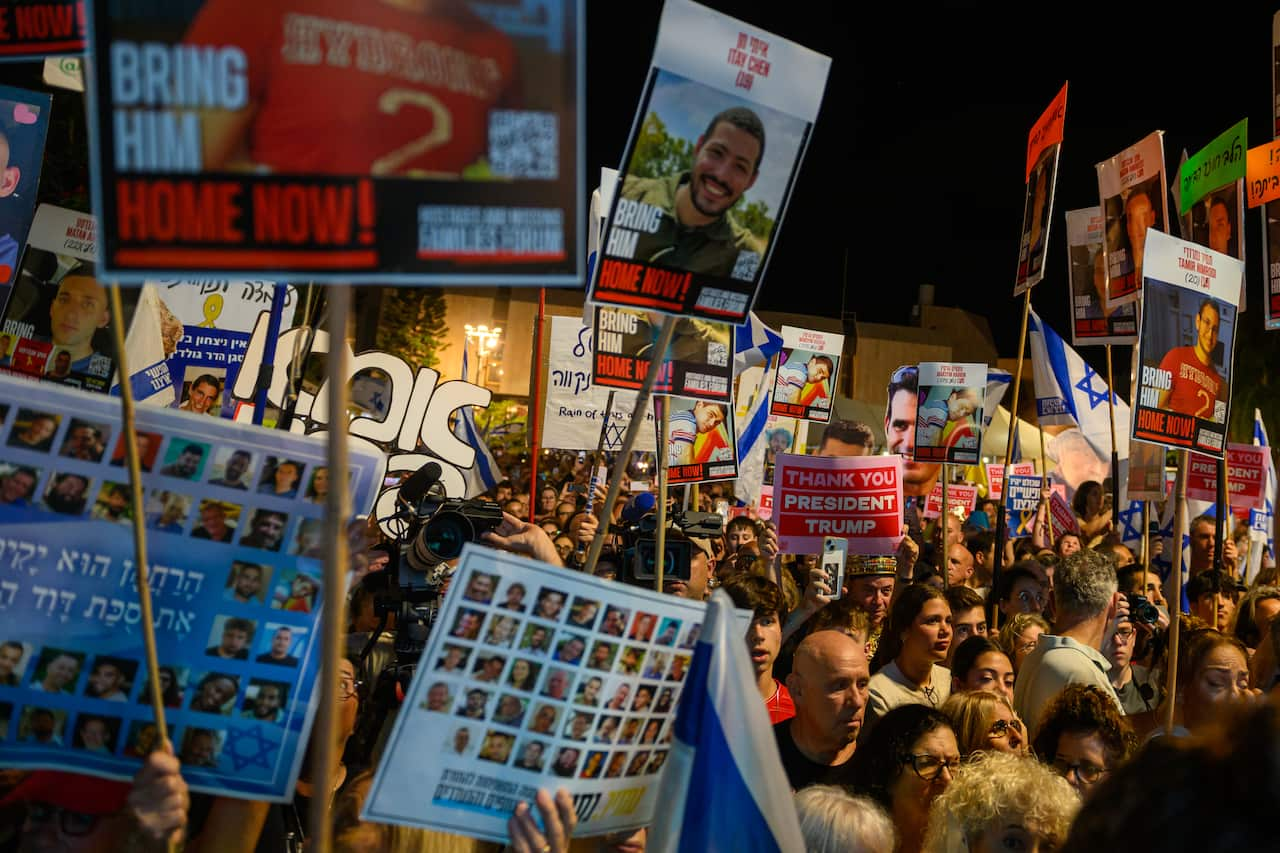
"Israelis overlook the fact that the same Trump supported Netanyahu, and his policy, until he reached the conclusion that it was time to end the war," Rabinovich says.
"Israelis who follow US and international politics were worried by several aspects of Trump's policies, but this scepticism is now concealed by the wave of enthusiasm that has swept the country."
'No American president has done more'
Emmanuel Navon, international relations lecturer at Tel Aviv University, says most Israelis appreciate and praise Trump for what they perceive he's achieved for Israel and the Middle East, not just the ceasefire.
"He's recognised Jerusalem as Israel's capital; has brought peace between Israel and three Arab countries; he has stricken Iran's nuclear sites … and he has blocked hostile decisions at the UN Security Council," Navon says.
Even Israelis who don’t like his politics and his style recognise his critical role in the liberation of hostages, and they are thankful for that.
During his Knesset address, Netanyahu thanked Trump for a list of actions that affirm him as the "greatest friend that Israel has ever had in the White House".
"No American president has ever done more for Israel," he said.
Among the actions Netanyahu listed and thanked Trump for was the US recognition of the Golan Heights as Israeli sovereign territory in 2019, but which is considered Syrian territory under international law and illegally occupied by Israel.
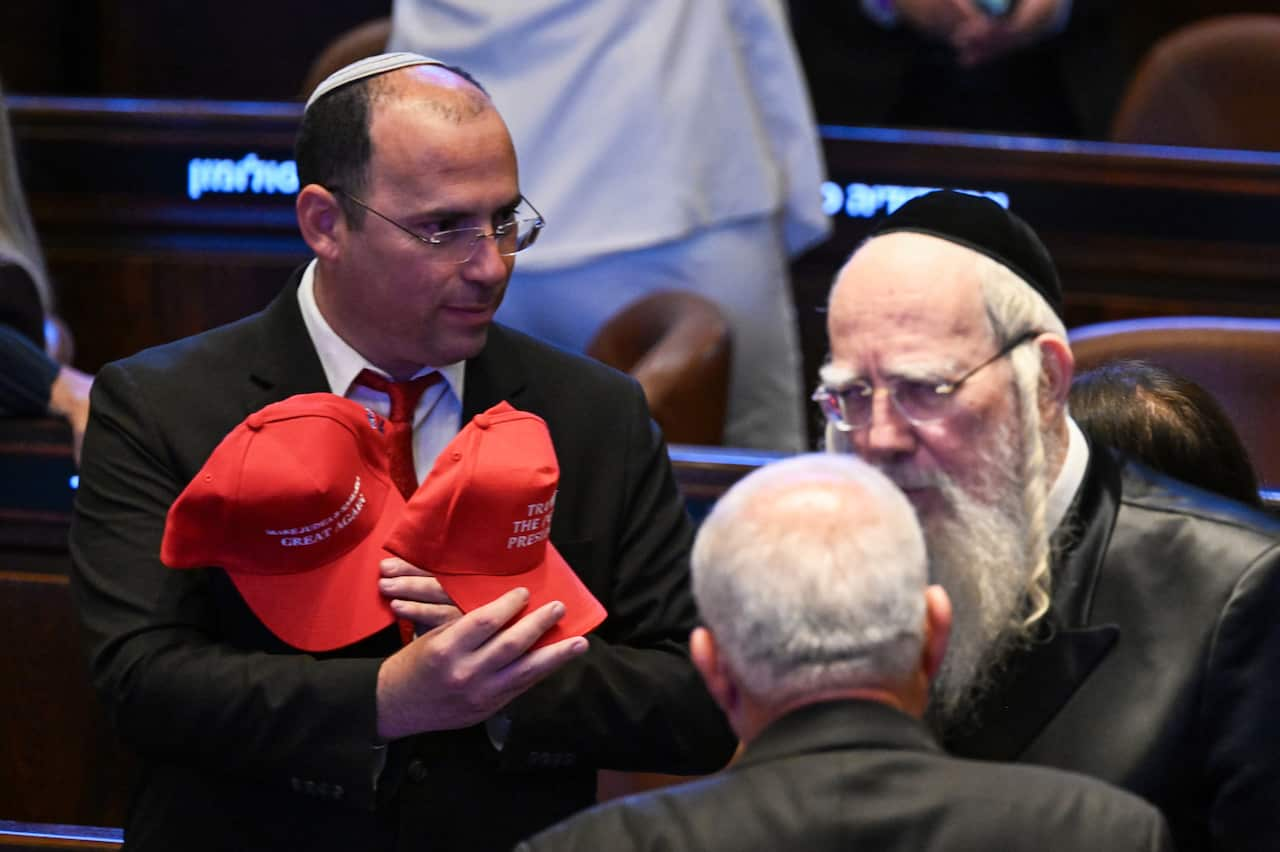
Netanyahu also pointed to the signing of the 2020 Abraham Accords, which led to Israel establishing relations with the Arab countries Bahrain and the United Arab Emirates. Morocco also later signed a similar agreement.
Trump's decision to withdraw the US from the Iran nuclear deal was also acknowledged, as was his approval for the attacks on three nuclear facilities in Iran as part of Operation Midnight Hammer this year.
Ahead of Trump's speech in the Knesset, Israeli President Isaac Herzog compared Trump to Cyrus the Great, a legendary figure in Jewish history who freed captive Jews in Babylon so they were able to return to Jerusalem.
"Thousands of years from now, the Jewish people will remember you. We are a nation that remembers," Herzog said.
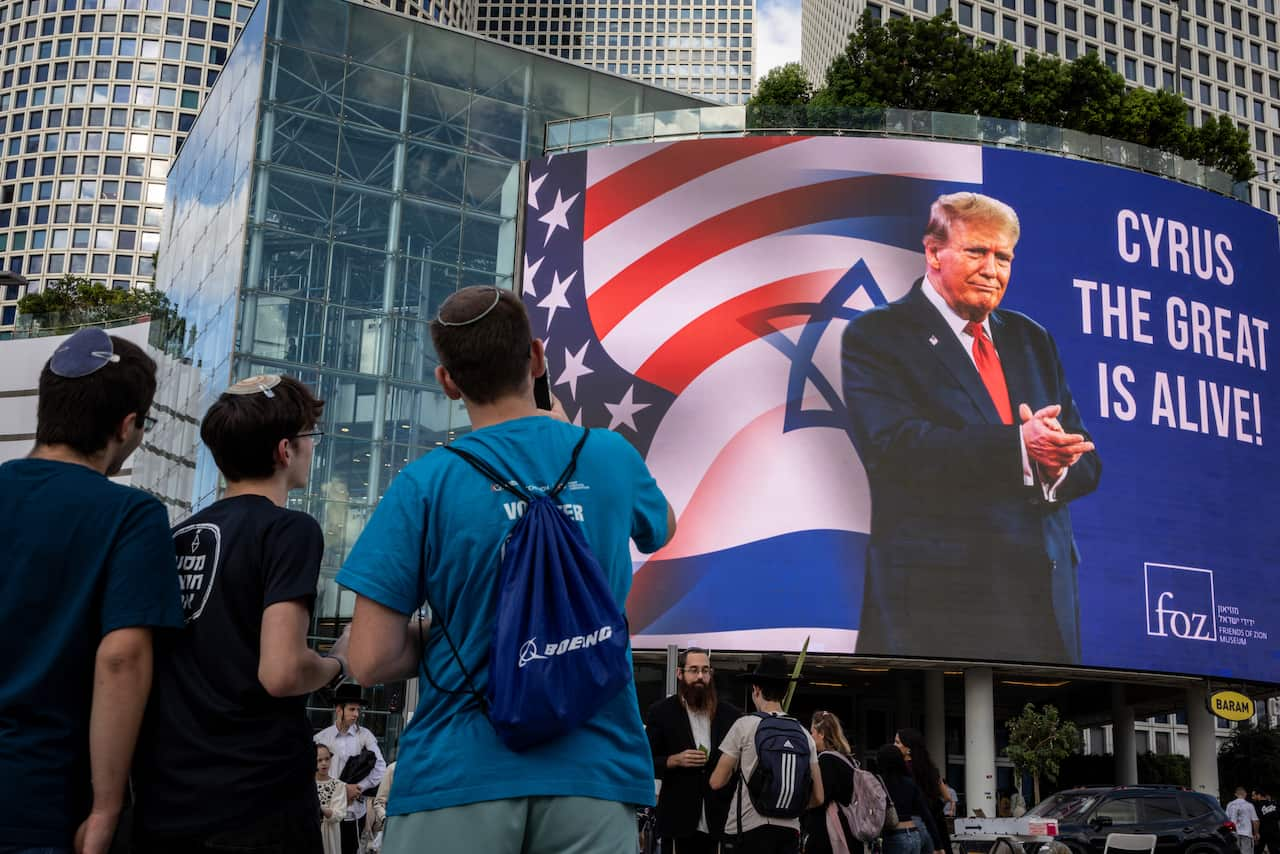
In his own speech, Trump acknowledged his personal links to Israel, saying his daughter Ivanka had converted to Judaism before marrying Jared Kushner, who is Orthodox Jewish.
Israel more supportive of Republican presidents
Jared Mondschein, director of research at Sydney University's United States Studies Centre, says Trump was "uniquely qualified" to broker the Gaza deal partly because he was perceived as being very pro-Israel.
He could go to Benjamin Netanyahu and say 'Look, you're not going to get a better deal from anyone else in the US. Take it or leave it'.
But Mondschein says Republican presidents have generally been received more favourably by Israelis than Democratic Party presidents.
Ahead of the 2024 US presidential election, polling by the Israeli Democracy Institute found 72 per cent of Jewish Israelis thought Trump would be better for Israel's interests, compared to just 11 per cent who supported Democratic nominee Kamala Harris.
Even among Israeli Arabs, 27 per cent favoured Trump, compared to 22.5 per cent for Harris.
Mondschein says compared with much of the developed world, Israel has a more positive view not just of Trump, but of America.
A survey published by the Pew Research Center in June this year found 83 per cent of Israelis had a favourable view of the US. This compares to the median of 49 per cent among the 24 countries surveyed. Just 29 per cent of Australians had a favourable view.
Trump's unconventional approach
Mondschein believes the Trump administration was successful in securing a deal in part due to its unique ties with the Arab world.
"In my view, the Trump administration has not shied away from embracing the Arab world," he says, pointing to Trump's decision to go to the Middle East, including Saudi Arabia, for his first official overseas visit as president in 2017.
"On the whole, the Trump administration has really curried favour with the Arab and Muslim world far more than prior administrations, both Democrat and alike."
These relationships have helped apply multilateral pressure on both the Hamas and Israeli leadership, Mondschein says.
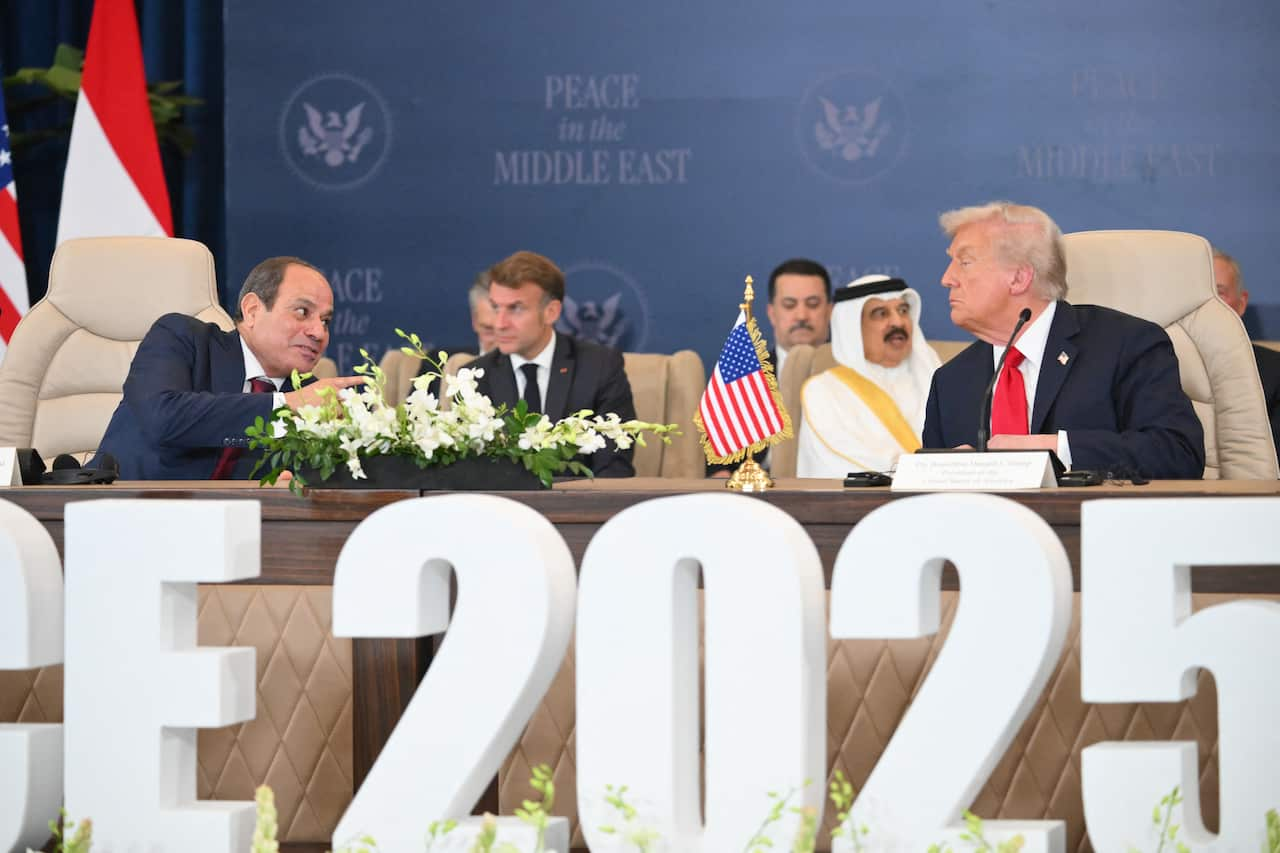
Mondschein also credits the Trump administration's unconventional approach, including engaging envoys — real estate developer Steve Witkoff and businessman Jared Kushner— who are not seasoned diplomats.
Kushner, who is also Trump's son-in-law, has business ties with many Gulf nations. Mondschein says some may consider this inappropriate for an envoy, but it may have built trust among Arab nations.
I can't emphasise enough how much this unconventional approach to the region has resulted in perhaps more progress than we've seen in decades.
Mondschein points out that 16 years of Republican and Democrat administrations had previously not made progress on the formal recognition of Israel among Arab and Muslim states — something the Trump administration was able to do with the Abraham Accords.
"That unconventional approach to the region has again, undoubtedly resulted in a more favourable outcome for Israel, and I would say the region more broadly, because it has, in my view, allowed for more stability in the region as a whole," he says.
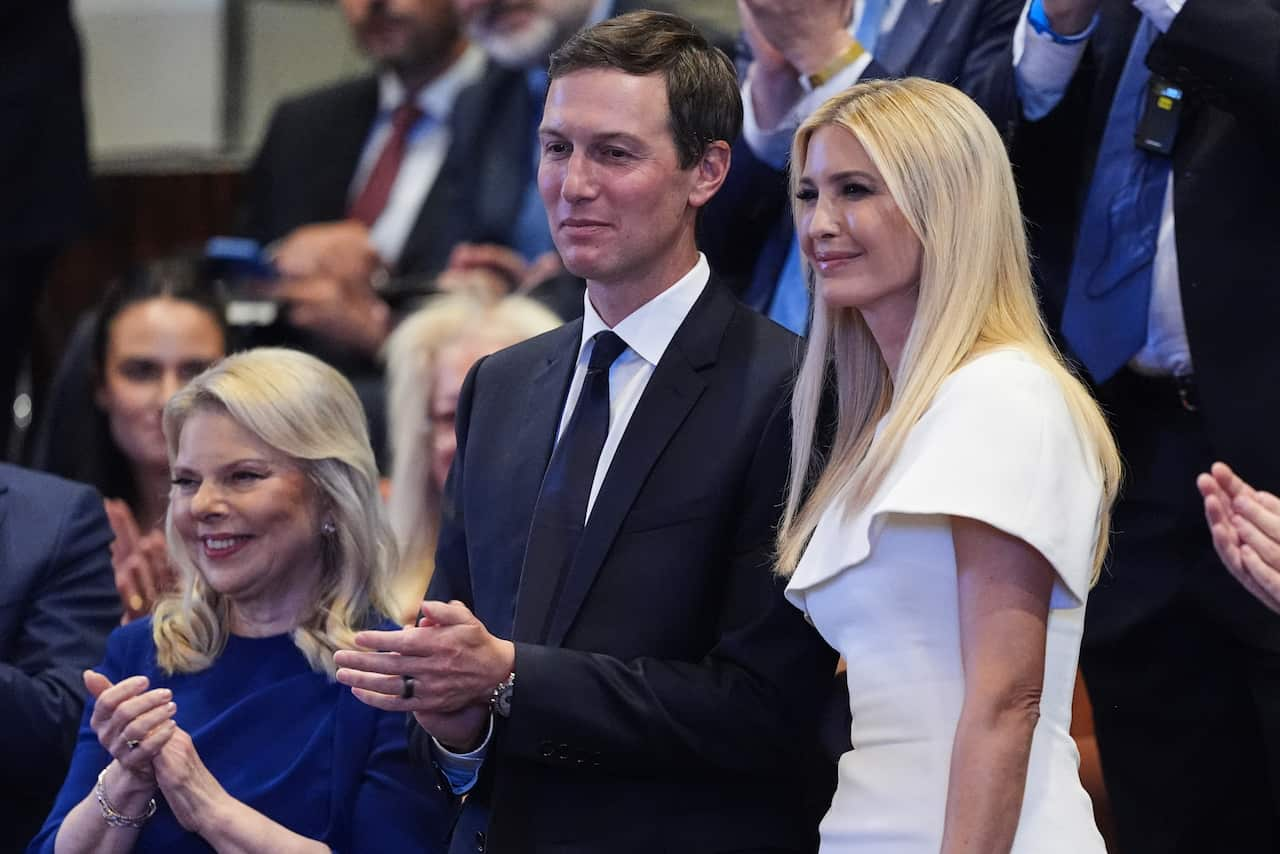
'That's it, we've won'
While Trump is being given the lion's share of the credit, Mondschein points out his 20-point plan is very similar to the plan developed by former Democrat president Joe Biden.
Biden also secured the release of 105 hostages in November 2023, and a ceasefire his administration helped broker was in place at the time of Trump's inauguration in January this year.
The ceasefire didn't hold once Trump took over, and there were many more months of bloodshed before another was negotiated.
Trump's initial plan to "take over the Gaza Strip" and turn it into a luxury tourist destination — dubbed the "Middle East Riviera" — was widely condemned by the international community and later walked back by the US administration.
His own 20-point plan was presented in late September and agreed to by both parties earlier this month, securing the return of the remaining hostages.
Mondschein notes that in the early days of regaining the presidency, Trump gave Israel plenty of backing, and his White House secretary told reporters on 20 March that Trump "fully supports" the deadly resumption of air and ground operations in Gaza, while blaming Hamas for the violence.
He believes public sentiment — reflected in protest actions in recent months — has applied pressure on world leaders, including Trump, to end the hostilities.
But Biden is now referred to as "Genocide Joe" — a label first used by pro-Palestinian supporters and later adopted by Trump supporters — and Netanyahu isn't getting the same credit as Trump among Israelis for ending the war.
During a public rally in Tel Aviv on Saturday night (local time), the crowd cheered when Trump's name was mentioned but booed when they heard Netanyahu's.
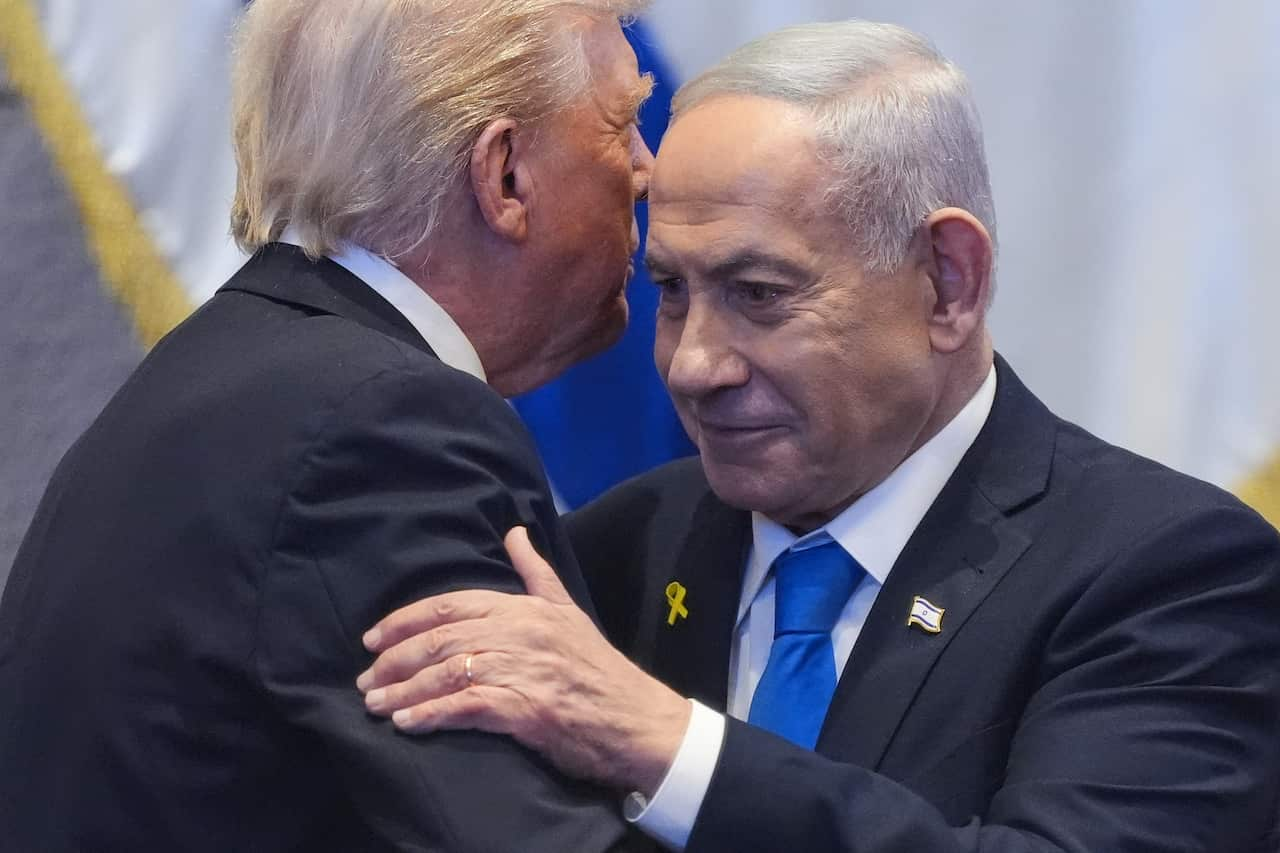
Polling commissioned by Israeli free-to-air TV station Channel 12 and aired in July found more than half of Israelis surveyed thought Netanyahu's handling of the Gaza war was bad, and 74 per cent wanted hostilities in Gaza to end and for the hostages to come home immediately.
"I think a lot of Israelis were convinced that Prime Minister Netanyahu was prolonging the war for domestic political reasons, whereas they saw Donald Trump as someone who wanted the war to end," Mondschein says.
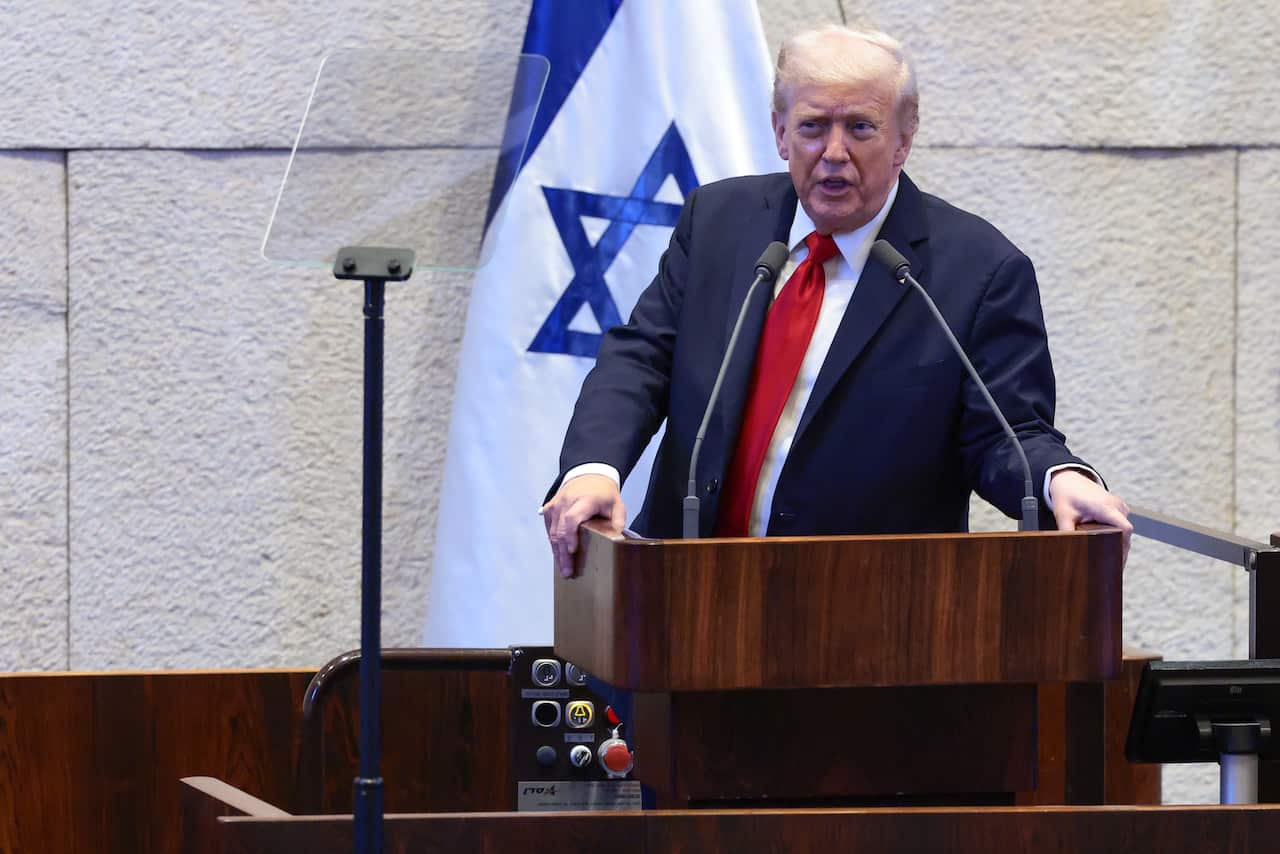
In his speech at the Knesset, Trump seemed to affirm this view, indicating he had told Netanyahu "it's now time" for the war to end.
"[I] said to Bibi [a nickname for Netanyahu], the world is big and strong and ultimately the world wins," he said.
"The world wanted peace and Israel wanted peace ... everybody did.
"I want to congratulate you for having the courage to say 'that's it, we've won', and now let's enjoy our lives and let's rebuild Israel and make it stronger and bigger and better than it's ever been before."
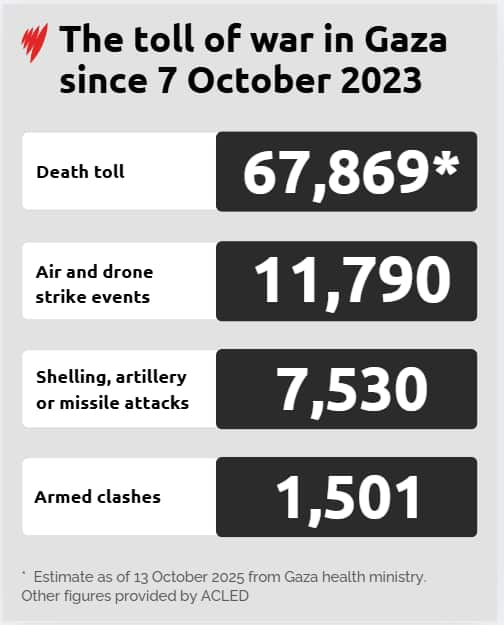
Navon agrees Israelis are divided over Netanyahu; they either loathe or admire him, depending on how they perceive his role in the liberation of hostages.
"But even those Israelis who are critical of Netanyahu must admit that he has led Israel to victory," he says, referring to the release of the remaining hostages this month.
"It will be for Israelis to decide at the next election whether they still want him in power or not.
"And it will be for history to judge his overall record."
Not everyone loves Trump
While Trump received a warm welcome at the Knesset with numerous standing ovations and glowing remarks from Israel's leaders thanking the US president, Trump's address to the parliament was briefly interrupted by two left-wing politicians.
Ofer Cassif and Ayman Odeh were both expelled after they attempted to interrupt proceedings.
A photo posted to Cassif's Instagram account showed a piece of paper emblazoned: "Recognize Palestine!"
"This is the banner I waved in front of Trump at the Knesset and was subsequently removed from the plenum," Cassif wrote.
Odeh, leader of Cassif's Hadash alliance, was also seen brandishing a page of paper and being removed.
On the plane back to Washington from the Middle East, Trump was asked whether he supported a two-state solution to the Israeli-Palestinian conflict.
"A lot of people like the one-state solution. Some people like the two-state solution. We'll have to see. I haven't commented on that," he told reporters aboard Air Force One on Monday.
Australia, along with the United Kingdom, Canada and Portugal, recognised Palestinian statehood this month at the United Nations General Assembly.
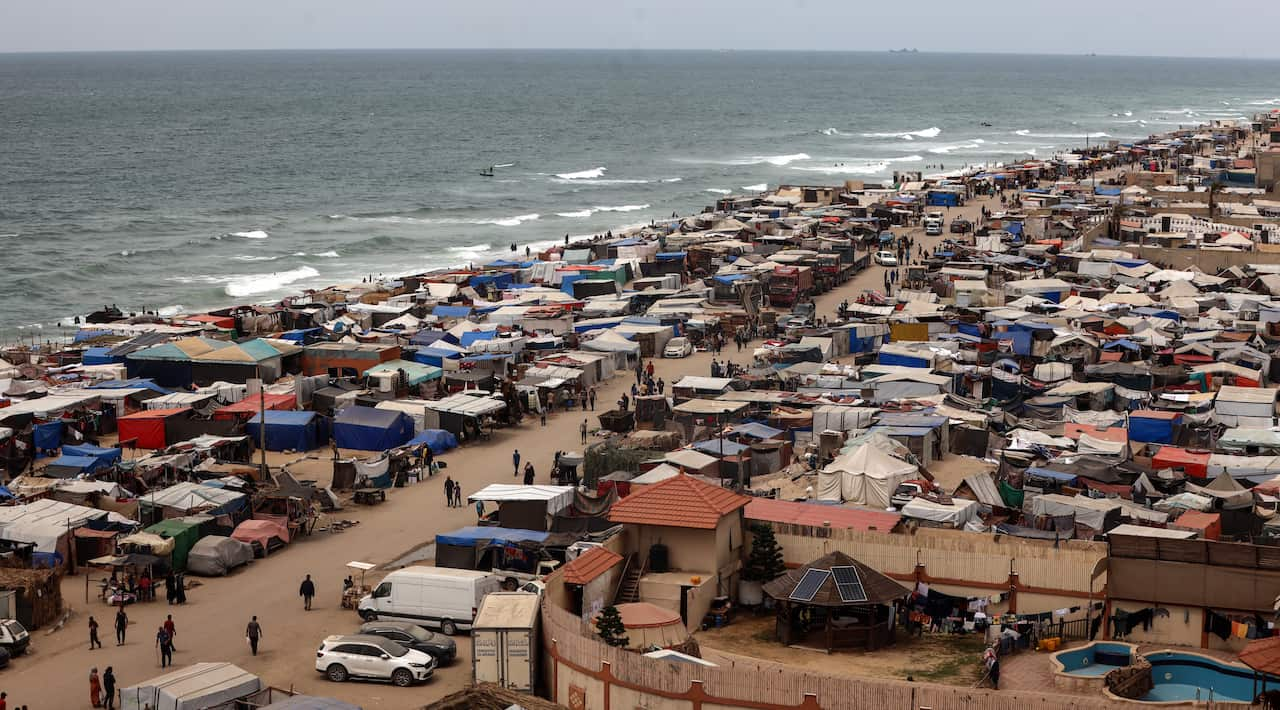
Mondschein says Palestinians have traditionally not had a favourable view of the US, although no country enjoys majority support among the population.
"I think the Palestinians over many generations now have seen one country after another not follow through on supporting their dreams and aspirations," he says.
"They really did not trust any country to pursue their support [for] them."
Before October 7, the Arab Barometer poll found 74 per cent of Palestinians had an unfavourable or somewhat unfavourable view of the US. Six weeks after October 7, 99 per cent reported being dissatisfied with the role of the US.
In the US, Mondschein says Jewish Americans, who are generally more progressive than average Americans, are also pretty torn in their opinions of Trump.
A poll of Jewish voters published in May by the Jewish Voters Resource Center found 74 per cent disapproved of the job Trump was doing as president, and opposed his proposal to transfer Palestinians out of Gaza so the US could redevelop the land.
More than half also thought Trump was antisemitic.
"On the whole, Jewish Americans mostly opposed Donald Trump, but there is far more support for his efforts in providing stability in the Middle East," Mondschein says.
"I think American Jews and Israelis would both support this peace agreement.
"Israeli Jews are perhaps less concerned about US domestic issues compared to American Jews, and that's pretty understandable."
Is this the dawn of a new era?
While Trump is spruiking the ceasefire as "the dawn of a new Middle East" and falsely claiming it's the eighth war he's settled in eight months, there's still a long way to go before there's peace in Gaza. (According to a fact-check by AP, several of the conflicts date back to Trump's first presidency, while others are not active wars.)
There have been reports of Hamas and rival groups fighting for dominance in Gaza, and concerns around the return of deceased hostages.
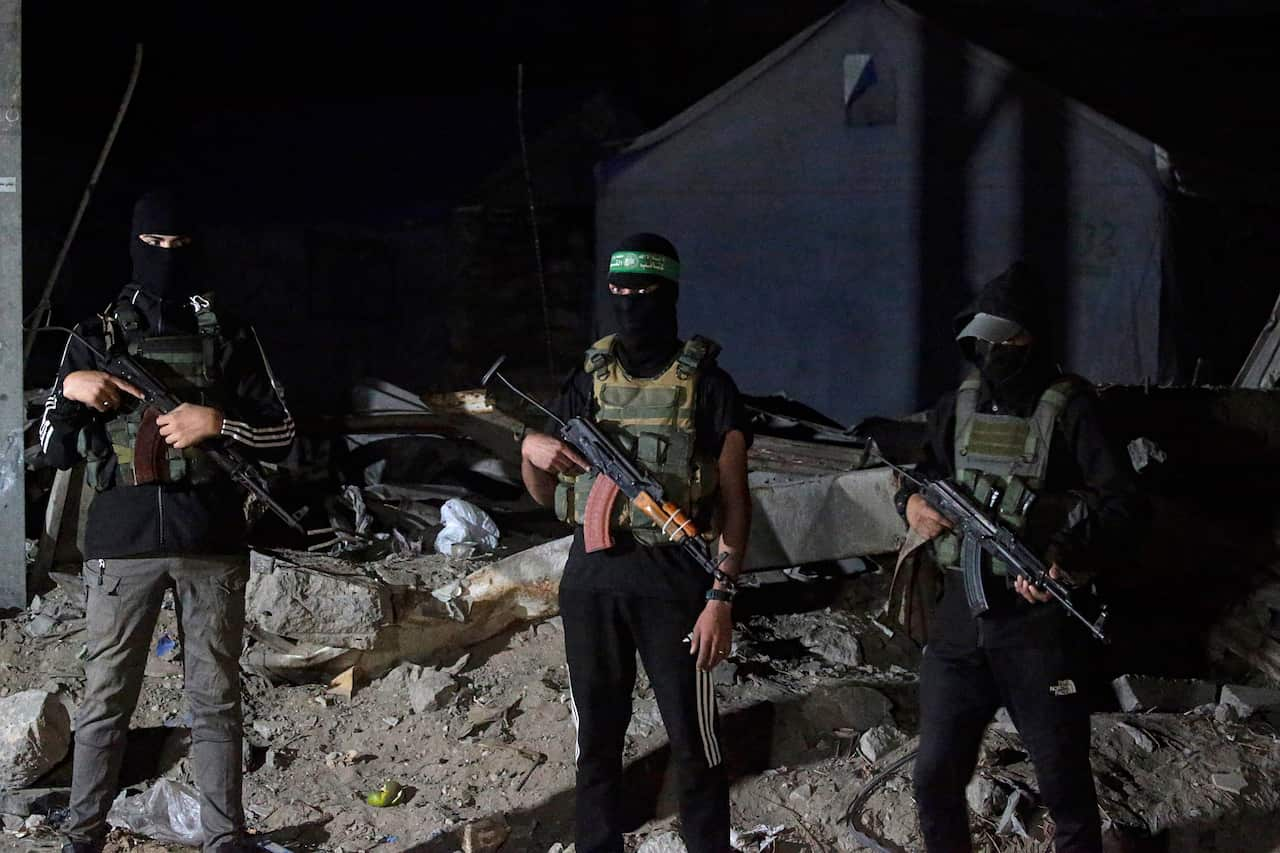
"The question is, are we going to enter a new era, or are we simply going back to October 6 of 2023, [when] much of the Palestinian people are seeking economic opportunities, but Hamas is rearming, and Israelis are hoping that the economic opportunities in Israel in particular will disincentivise any attacks? That is the big question," Mondschein says.
"I think a big determinant of where we go from here is where the international community goes."
Mondschein says it's not yet clear what assistance will be provided as part of an international stabilisation force.
"Are there going to be boots on the ground in Gaza, or are they simply going to provide more aid?
"There's a lot of details to still be determined."
— With additional reporting by Agence France-Presse
